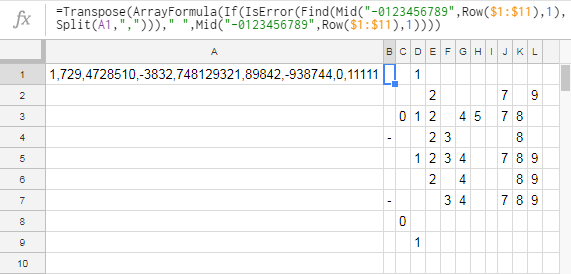Input:
A list of integers
Output:
Put each digit (and the minus sign) in its own lane, in the order -0123456789, ignoring any duplicated digits.
Example:
Input: [1,729,4728510,-3832,748129321,89842,-938744,0,11111]
Output:
-0123456789 <- Added as clarification only, it's not part of the output
1
2 7 9
012 45 78
- 23 8
1234 789
2 4 89
- 34 789
0
1
Challenge rules:
- Any duplicated digits in the number are ignored.
- I/O can be in any reasonable format. Input can be as a list/array of strings or character-array. Output can be as a list of strings, characters, character-matrix, etc.
- Trailing spaces are optional.
- Any amount of leading or trailing new-lines are optional (but not in between lines).
- Input will always contain at least one integer
- You'll have to support an integer range of at least
-2,147,483,648though2,147,483,647(32-bit). - The input-list will never contain
-0,00(or more than two zeroes), or integers with leading zeroes (i.e.012). - If your language uses a different symbol for negative numbers (like an upper
¯), you are also allowed to use that instead, as long as it's consistent. - You are allowed to have a space delimiter between digits (so a line without 5 or 8 can be
- 0 1 2 3 4 6 7 9instead of-01234 67 9), as long as it's consistent (and therefore there should also be a space between-and0).
General rules:
- This is code-golf, so shortest answer in bytes wins.
Don't let code-golf languages discourage you from posting answers with non-codegolfing languages. Try to come up with an as short as possible answer for 'any' programming language. - Standard rules apply for your answer, so you are allowed to use STDIN/STDOUT, functions/method with the proper parameters and return-type, full programs. Your call.
- Default Loopholes are forbidden.
- If possible, please add a link with a test for your code.
- Also, please add an explanation if necessary.
Test cases:
Input: [1,729,4728510,-3832,748129321,89842,-938744,0,11111]
Output:
1
2 7 9
012 45 78
- 23 8
1234 789
2 4 89
- 34 789
0
1
Input: [4,534,4,4,53,26,71,835044,-3559534,-1027849356,-9,-99,-3459,-3459,-94593,-10234567859]
Output:
4
345
4
4
3 5
2 6
1 7
0 345 8
- 345 9
-0123456789
- 9
- 9
- 345 9
- 345 9
- 345 9
-0123456789
Input: [112,379,-3,409817,239087123,-96,0,895127308,-97140,923,-748]
Output:
12
3 7 9
- 3
01 4 789
0123 789
- 6 9
0
123 5 789
-01 4 7 9
23 9
- 4 78
Input: [-15,-14,-13,-12,-11,10,-9,-8,-7,-5,-4,-3,-1,0,9,100,101,102,1103,104,105,106,116,-12345690]
Output:
- 1 5
- 1 4
- 1 3
- 12
- 1
-01
- 9
- 8
- 7
- 5
- 4
- 3
- 1
0
9
01
01
012
01 3
01 4
01 5
01 6
1 6
-0123456 9
Input: [99,88,77,66,55,44,33,22,11,10,0,0,0,-941]
Output:
9
8
7
6
5
4
3
2
1
01
0
0
0
- 1 4 9


¯instead of-? \$\endgroup\$"-0 1 2 3 4 <space> 6 7 <space> 9"(Multiple spaces get collapsed in comments, for some reason) \$\endgroup\$